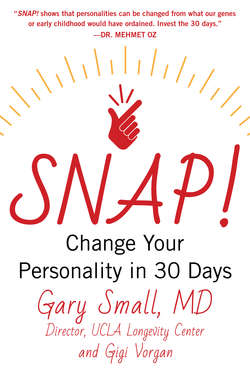Читать книгу SNAP! - Gary Small - Страница 22
На сайте Литреса книга снята с продажи.
Taking Action
ОглавлениеAfter someone has defined the new behavior they desire and planned how they will achieve it, they enter the acting phase of change. Hopefully, they have prepared themselves to meet reasonable goals along a manageable timeline. However, success may require a willingness to adjust that timeline if necessary. My friend Jackson began taking one flight of stairs up to his office the first week. During the second week of his program, Jackson graduated to two flights each day, but the third week he caught a cold and was too tired to take the stairs, so he had a temporary setback. Once he recovered, he was able to get back to two flights each day without much effort and was encouraged by the endurance he had built up in a relatively short period of time.
Personality change is challenging for many people, and it is not surprising that lapses and relapses sometimes occur. A lapse is a single slip back to an old behavior, while a relapse is a more significant backslide. Knowing that lapses are common during the acting phase and reframing them as temporary setbacks can help people avoid feeling out of control. If they allow themselves to bounce back to their new behaviors swiftly, they can avoid letting a minor lapse evolve into a relapse.
Some people find they can gain a greater sense of mastery over their new behavior when they intentionally plan a minilapse—perhaps a day off from their exercise routine or a cheat meal from their diet. They learn that they can return to their new behaviors quickly following a slip and gain confidence that they will be able to bounce back from any future unplanned setbacks. Therapists, supportive friends, wellness coaches, and others can serve as informal cheerleaders to help people stay the course during the acting phase.
Shirley’s behavior therapist taught her ways to better manage her anxiety and its accompanying symptoms. She started using a guided meditation app on her smartphone that she began using every morning as well as throughout the day when she needed to calm her worries. One morning she couldn’t find her wallet and was late for work, and it threw her into a panic. For the next few days, her meditation app didn’t seem to help. Luckily she had the good sense to call her therapist, who was able to reassure her that her lapse was temporary and she could recover quickly. That brief phone call was enough to get her back on track and make her feel greater control over her anxiety once again.
